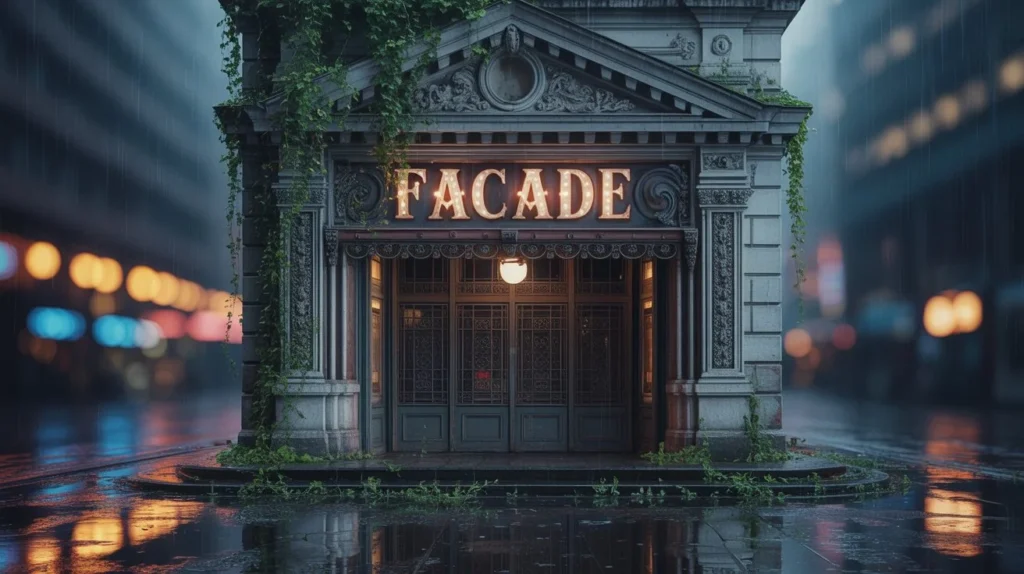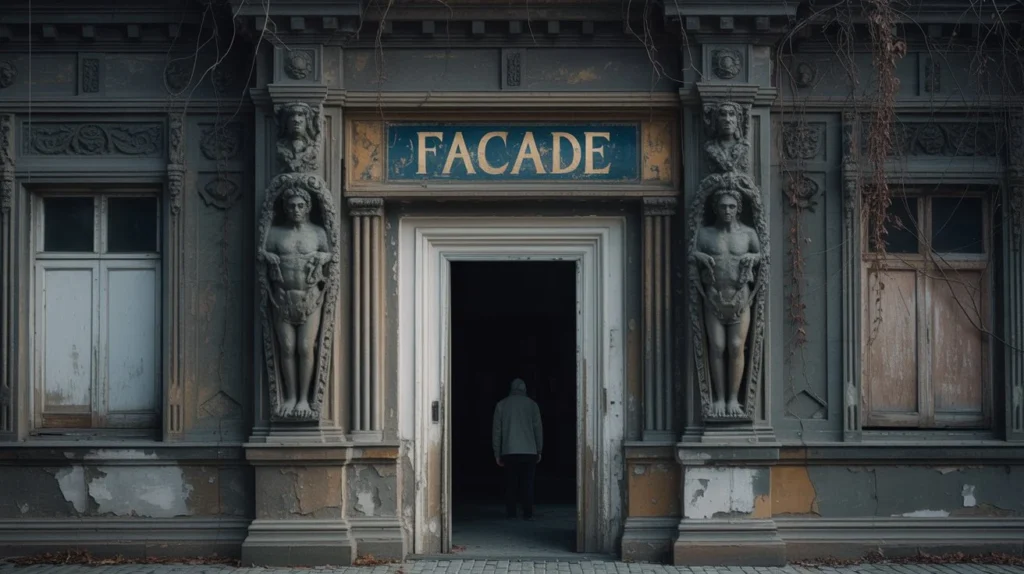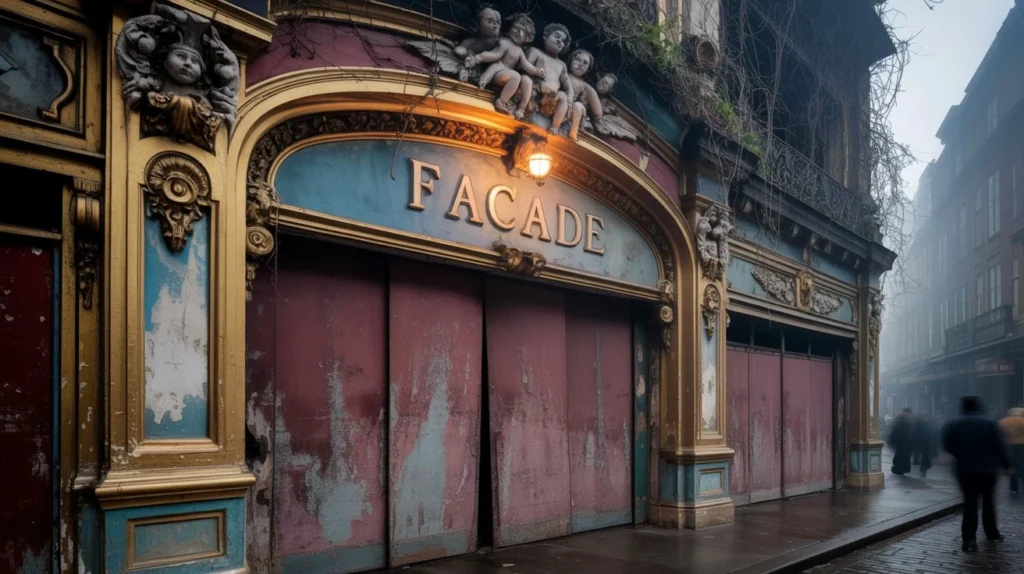We all encounter facades in life—whether in architecture or emotions—but what exactly does the word facade mean? It’s one of those terms that appear in everything from construction blueprints to daily conversations about human behavior. In this article, we’ll break down the facade meaning, explore its roots, see where it’s used, and understand why it’s so relevant in both design and personal life.
Let’s pull back the curtain and get to the real story behind the word facade.
What Is the Meaning of “Facade”?
The word facade (also spelled façade, with a cedilla under the “c” in French) originates from the Latin word facies, meaning “face.” In English, facade refers to the front or outward appearance of something, often hiding what’s really inside.
There are two main contexts in which we use this term:
- Literal (Architectural): The face or exterior of a building.
- Figurative (Emotional or Social): A false or deceptive appearance someone puts on.
For example:
- In architecture, the front facade of a house is the first thing people notice.
- In social situations, someone might put on a facade to hide sadness behind a smile.

Façade Meaning in English: Quick Definitions
Here’s a quick breakdown of facade meaning in English based on context:
| Type | Definition |
|---|---|
| General | Outward appearance maintained to conceal a less pleasant reality |
| Architecture | The face or front of a building, especially the principal front |
| Psychological/Behavioral | A false persona used to hide one’s true emotions or intentions |
| Construction | The external wall or face of a building, which can be decorative or structural |
Facade Meaning in Architecture and Construction
In the world of architecture, a facade is the most prominent external face of a building, often designed to make a visual impact. It could be made of glass, stone, brick, or metal.
- Stone facade meaning: Refers to a building exterior made or clad with stone for aesthetic appeal.
- Building facade meaning: Often includes design features like windows, doors, columns, and ornaments.
- Exterior facade meaning: Simply means the outward-facing surface of a building, especially the one facing the street.
These facades aren’t just decorative—they can also play a key role in energy efficiency and ventilation, especially in modern design.

Psychological and Emotional Usage: Putting on a Facade
“Putting on a facade” meaning goes much deeper than bricks and mortar. In everyday conversation, saying someone is “putting up a facade” or “putting on a fake face” means they’re hiding their true feelings behind a false front.
- Example: “She smiled throughout the party, but it was just a facade. Inside, she was falling apart.”
This usage is powerful in emotional and psychological contexts:
- Facade meaning fake: Implies inauthenticity—what you see isn’t what you get.
- Pathological facade meaning: In psychology, this refers to persistent emotional masks used to hide trauma or pain. It may even be tied to disorders or chronic emotional suppression.
When someone maintains a facade for too long, it can lead to mental exhaustion and disconnection from their true self.

🧠 Real-Life Examples of Facade Use
| Context | Description | Example |
|---|---|---|
| Workplace | Acting confident while feeling unsure | “He put on a confident facade in front of clients.” |
| Relationships | Smiling through pain | “She kept up the loving facade even during fights.” |
| Social Media | Showing only the good parts | “Many profiles show a curated facade of life.” |
| Mental Health | Hiding inner struggles | “A pathological facade can develop as a survival mechanism.” |
Facade in Everyday Life: From Houses to Humans
From the house facade meaning to social masks, facades are everywhere. In urban planning, designers focus on architecture facade meaning to improve aesthetics and airflow. In real life, people focus on emotional facades to protect themselves or manipulate perception.
Sometimes, it’s necessary—like staying strong for others. But too much can become isolating.
And when someone says they live with no facade, it means they’re authentic, vulnerable, and real—what you see is what you get.
Examples of Using “Facade” in a Sentence
To help you fully grasp the word, here are several real-world examples:
- The stone facade gave the house a timeless charm.
- Despite his laughter, it was clear he was putting on a facade to hide the pain.
- Her pathological facade made it hard to tell what she was really feeling.
- The building’s exterior facade was restored to preserve its historical value.
- He lives with no facade, and that’s what makes him refreshing.
Synonyms for “Facade”
If you’re writing or speaking and want to express a similar idea, here are some synonyms:
| Literal (Architecture) | Figurative (Emotional) |
|---|---|
| Front | Mask |
| Exterior | False front |
| Face | Pretend identity |
| Surface | Deception |
5 Common FAQs About Facade
1. What does “put on a facade” mean?
It means to pretend to be something you’re not, usually to hide true feelings or situations. People often use it to protect themselves emotionally.
2. What is the facade meaning in architecture?
In architecture, a facade is the front face of a building, often designed to be visually appealing and represent the building’s style.
3. Is facade always negative?
Not always. In architecture, it’s neutral or positive. In emotional contexts, it often implies dishonesty or emotional masking, but sometimes it’s used to cope or protect.
4. What is a pathological facade?
It refers to chronic emotional masking—when someone habitually hides their true self due to trauma, fear, or mental health issues.
5. Can a facade be real?
Yes. In buildings, a facade can be both real and structural. In emotional terms, it’s usually metaphorical and not genuine.
Conclusion: Why Understanding Facades Matters
Whether it’s the sleek glass front of a skyscraper or the smile someone wears during tough times, facades shape our perception. Understanding the facade meaning—in all its forms—helps you become more aware of both the built environment and human behavior.
So next time you see a beautiful house facade or feel like someone’s not being authentic, you’ll know there’s often more behind the front than meets the eye.





